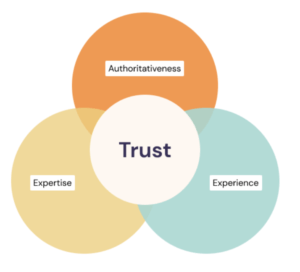2022 was a big year for Google search and SEO. Google did a major refresh of their Webmaster Guidelines (now called Google Search Essentials), they’re working to combat AI and much, much more. However, there’s one change you may have missed: Google’s latest algorithm change that was announced just before the holidays.
Content creators know that the acronym E-A-T makes up the search rater guidelines (PDF): expertise, authoritativeness, and trustworthiness. Now, they’ve added another E to the equation: experience.

How does Google define experience?
Experience: Consider the extent to which the content creator has the necessary first-hand or life experience for the topic. Many types of pages are trustworthy and achieve their purpose well when created by people with a wealth of personal experience. For example, which would you trust: a product review from someone who has personally used the product or a “review” by someone who has not?
While Trust remains at the heart of search results, adding in first hand experience was done to enhance people with first hand knowledge and experience of a product, information or service.
Why make this change? We recently discussed how Google is going to penalize content scrapers and AI-written content to protect their core business. This comes as no surprise as they’re now sounding a red alarm over AI internally as well.
Per Google, “these guidelines are what are used by our search raters to help evaluate the performance of our various search ranking systems, and they don’t directly influence ranking. They can also be useful to creators seeking to understand how to self-assess their own content to be successful in Google Search.”
This post originally appeared on the Large Media blog.
